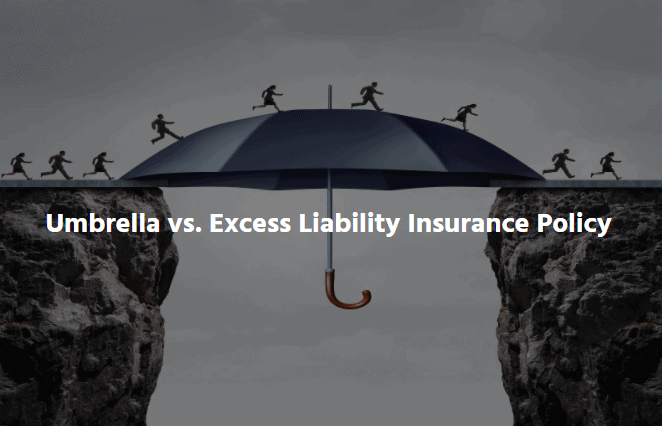
Umbrella vs. Excess Liability Insurance Policy
Both the Umbrella Insurance Policy and the Excess Liability Insurance Policy Provide an extension to the already existing insurance policies. However, they do have minor differences. Before we delve into the differences which separate the two seemingly similar policies from each other. It is better to briefly define what they are;
Umbrella Insurance
An Umbrella Insurance is a policy that extends beyond the parameters of a normal insurance policy. It provides additional coverage when the normal policies have exhausted their limits. Consider it an additional layer of security to your already existing business framework. An Umbrella Insurance Policy does not follow an underlying insurance policy form.
Umbrella Insurance pays for claims that exceed normal Insurance
Excess Liability Insurance
Excess Liability insurance policy provides as additional protection to the already existing insurance policies that you possess. In case the damages exceed the maximum payout from a normal insurance policy. In simple words, excess liability is a safety net that provides protection. When all else countermeasures fall short of protecting you legally and financially. It covers the costs when traditional policies exceed their limitations. An Excess Liability Insurance follows an underlying insurance policy form.
Excess Liability is sometimes called Insurance for your Insurance
Analysis
This discussion often pops up in the relevant circles what exactly separates the Excess Liability from Umbrella Insurance. Too often the users use the words interchangeably i.e. using one terminology while meaning to refer to the other one.
Among the few things to note;
- The first is that a true Umbrella Policy typically includes a deductible in the coverage form. This is called Self Insured Retention (SIR).
- The second is that, just because a policy provides protection for more than one coverage parameter. Does not necessarily make it an Umbrella Policy.
- The third is that an Umbrella Policy is much broader in scope than a typical Excess Liability Policy.
Both Umbrella and Excess Liability policies are used to increase the underlying limits of typical policies. Both provide a safety net of sorts.
If I were you, I would prefer to get an Excess Liability Insurance Policy near me. And the same goes for Umbrella.
For example, even if you carry the standard General Auto Liability. There may occur an incident in which you total an expensive sports car with your regular SUV. The resulting liabilities from such an incident would surely overwhelm your typical policy’s limits. when the insurance policy’s limits are reached. You would have to pay the additional amount you owe from your own pockets. In such a scenario, Umbrella or Excess Liability insurance would save you from potential bankruptcy and cover the excess damages.
Differences Between Umbrella and Excess Liability
Umbrella Insurance
- It is a type of insurance policy that provides additional limits over the underlying liability insurance.
- Its biggest advantage is that it provides additional coverage. Typical policies do not include these.
- It also helps broaden the business insurance liability. So the gaps that may have been intentionally or unintentionally left in coverage are filled and eliminated.
- It offers first dollar liability coverage which is above any deductible or retained limit.
Excess Liability Insurance
- It also provides additional limits over the underlying liability policies.
- Its additional limits are more restrictive than umbrella insurance.
- It incorporates and follows all definitions and limits underlying policies.
- It does not provide additional coverage which underlying policies may be lacking.
Important Note about Umbrella and Excess Liability Insurance:
The most glaring difference is that the umbrella exceeds the limits placed on the underlying policy. And goes above and beyond the scope of its parent policy. While excess liability insurance provides additional coverage within the limitations of its parent policy.
Necessity of Umbrella or Excess Liability Insurance Policy
Either of these policies may provide your company with additional protection. You should prepare yourself. Because your company may get sued in a court of law. Any claims made by others, including personal harassment, physical injury, property damage. You will be legally required to pay monetary compensation; or non-business liabilities, such as, slander, false arrest, libel. Either of these policies can cover the defense costs for attorneys.
The Typical Range
The limits provided in Umbrella and Excess Liability Insurance Plan can range from $1 Million to $5 Million. And even above that. The right amount is dependent upon the value of the assets you require protection for. Or any new potential assets you may require coverage for in the future.
The Limitation
An umbrella policy can be the better decision. If extra coverage is needed. Umbrella has a broader form and does not simply follow the terms and conditions of the underlying policy. But goes beyond that in its scope. It covers the gaps that are missed in underlying policies. However, it can be the more expensive option of the two. Excess Liability Umbrella Insurance Plan, however, follows the limitations of the underlying policies. As such, there is a lack of excitement or chances of dispute in Excess Liability.
Conclusion
If the claim costs start to rise from a lost lawsuit. It is always helpful to check into both of these options. To help provide extra protection for your company or personal excess liability insurance. Because of the rising costs, the typical $1 Million policy isn’t what it used to be. You definitely don’t want to find that out when that large claim happens that exceeds your usual limitations.
SGA Financial Inc. provides you with Excess Liability Insurance Policy in Dallas, Texas. Contact us for more information. We will clarify if you have some confusion in your mind. Because we are always happy to help.

